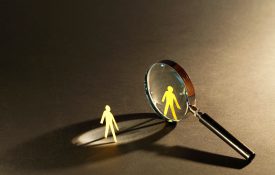-

Heavily Decorated Classrooms Disrupt Attention and Learning In Young Children
Researchers hope some new findings may eventually generate guidelines to help teachers optimally design classrooms.
-
New Research From Clinical Psychological Science
Read about latest research findings published in Clinical Psychological Science: Jenny Yiend, Charlotte Parnes, Kirsty Shepherd, Mary-Kate Roche, and Myra J. Cooper New research has suggested that negative self-beliefs play a role in eating disorder pathology, but the causal status of this relationship has not yet been established. Female participants underwent cognitive-bias-modification (CBM) training meant to manipulate eating disorder-relevant negative self-beliefs in a positive/neutral or a negative direction. Symptoms and behaviors related to eating disorders, depression, and anxiety were assessed before and after training and at a 1-week follow-up.
-

Reflections on the Failure of Ignorance to Recognize Itself
Distinguished Lecturer David Dunning of Cornell University explores research into the accuracy — and, more commonly, the errors — of human judgment.
-
Read, Kids, Read
The New York Times: Late last year, neuroscientists at Emory University reported enhanced neural activity in people who’d been given a regular course of daily reading, which seemed to jog the brain: to raise its game, if you will. ... Daniel Willingham, a psychology professor at the University of Virginia, framed it as a potentially crucial corrective to the rapid metabolism and sensory overload of digital technology. He told me that it can demonstrate to kids that there’s payoff in “doing something taxing, in delayed gratification.” A new book of his, “Raising Kids Who Read,” will be published later this year.
-
Personal Judgments Are Swayed by Group Opinion, but Only for 3 Days
We all want to feel like we’re free-thinking individuals, but there’s nothing like the power of social pressure to sway an opinion. New research suggests that people do change their own personal judgments so that they fall in line with the group norm, but the change only seems to last about 3 days. The research is published in Psychological Science, a journal of the Association for Psychological Science. “Our findings suggest that exposure to others' opinions does indeed change our own private opinions -- but it doesn’t change them forever,” says psychological scientist and study author Rongjun Yu of South China Normal University.
-
A Slow-Tech Approach to Tracking Spending
The New York Times: Last week, Psychological Science published a study about how well students recall a lecture if they type the notes or write them longhand. While the students who typed could take more notes, they didn’t perform as well on conceptual questions. The researchers showed that the typists took notes verbatim, while the writers processed what they heard and then wrote the ideas in their own words. The writers could better remember the message because they’d actually processed what it meant. I think something similar happens when we try to automate our budgeting process. Pulling in all our purchases automatically sounds an awful lot like typing notes verbatim.

